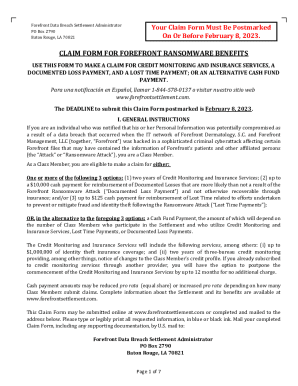Will Reform UK Deliver On Its Promises? A Critical Analysis Of Farage's Party

Table of Contents
Reform UK's Core Policy Positions
Reform UK's policy platform covers a wide range of issues, often presented as radical departures from the mainstream. Key areas of focus include Brexit, immigration, economic policy, and NHS reform. Understanding these positions is crucial to evaluating Reform UK's potential.
Brexit and EU Relations
Reform UK advocates for a complete break from the European Union, going beyond the current arrangements. Their post-Brexit vision involves severing all ties with EU regulations and forging independent trade agreements. Regarding the Northern Ireland Protocol, Reform UK seeks a complete dismantling, prioritizing the sovereignty of the UK over any agreements with the EU.
- Policy Proposals: Complete withdrawal from the single market and customs union; termination of the Northern Ireland Protocol; negotiation of bilateral trade deals outside the EU framework.
- Strengths: Appeals to a segment of the population who feel the current Brexit deal is insufficiently distanced from the EU.
- Weaknesses: Potential negative economic consequences from disrupting existing trade relationships; the complexity of renegotiating trade deals and the risk of trade wars. The impact on Northern Ireland remains a major concern.
- Potential Impact: Significant uncertainty, ranging from economic benefits from independent trade deals to potential harm due to trade friction and reduced market access.
Immigration and Border Control
Reform UK champions a stricter approach to immigration and border control, emphasizing reduced immigration numbers and increased security. Their policies focus on controlling illegal immigration and tightening asylum processes.
- Specific Proposals: Increased border security measures; stricter asylum criteria; a points-based immigration system prioritizing skilled workers.
- Feasibility and Consequences: The feasibility of achieving significant reductions in immigration while maintaining economic needs is questionable. Such policies may face legal and ethical challenges.
- Comparison to Current Policies: Reform UK's proposals represent a more restrictive approach than current UK immigration policies.
Economic Policies
Reform UK's economic policies often center on tax cuts and reduced public spending. They advocate for lower taxes for businesses and individuals, believing this will stimulate economic growth.
- Tax and Spending Proposals: Significant cuts to corporation tax and income tax; reductions in public spending on certain areas.
- Potential Economic Consequences: Supporters argue that tax cuts will incentivize investment and create jobs, leading to economic growth. Critics, however, warn of potential deficits and cuts to essential public services.
- Comparison to Other Parties: Reform UK's economic policies generally represent a more right-leaning approach compared to other major parties.
National Health Service (NHS) Reform
While Reform UK hasn't outlined specific detailed plans for NHS reform, their general approach suggests a focus on increased efficiency and potentially reduced public funding.
- Proposals (General): Improved efficiency and effectiveness within the NHS; potential focus on private sector involvement.
- Feasibility and Impact: The potential impact of any proposed reforms is unclear without specific details. The feasibility of achieving improvements while managing public expectations remains a significant challenge.
- Comparison to Current NHS Policy: The party’s vague proposals suggest a departure from the current emphasis on increased public funding for the NHS.
Feasibility and Challenges Faced by Reform UK
While Reform UK's policy proposals attract support, the party faces significant challenges in implementing them.
Electoral System and Representation
The UK's first-past-the-post electoral system poses a significant hurdle for Reform UK. The party's dispersed support makes it difficult to win many seats, even with relatively high levels of public support.
- Electoral Performance: Reform UK has yet to achieve significant electoral breakthroughs.
- Electoral Strategy: Their strategy focuses on targeting specific constituencies and capitalizing on dissatisfaction with established parties.
- Likelihood of Parliamentary Seats: Their chances of gaining a significant number of seats in Parliament remain limited under the current system.
Public Opinion and Support
Public opinion towards Reform UK is mixed. While some resonate with their strong stance on issues like Brexit and immigration, others are wary of their potentially divisive rhetoric and radical proposals.
- Public Opinion Polls: Polling data shows fluctuating levels of support for Reform UK.
- Support for Key Policies: Support for individual policies varies considerably across the population.
- Influencing Factors: Public perception of Nigel Farage's leadership plays a significant role in shaping overall public opinion.
Political Opposition and Coalition Prospects
Reform UK's potential for forming a coalition government is limited due to their strong ideological stance and limited electoral success. Their policies often clash with those of other major parties.
- Potential for Coalition: The likelihood of Reform UK forming a stable coalition is low due to limited parliamentary representation and ideological differences with other parties.
- Challenges in Forming a Coalition: Other parties may be reluctant to compromise on their core principles to form a coalition with Reform UK.
- Obstacles to Achieving Policy Goals: Their limited parliamentary influence could severely hinder their ability to enact their policy agenda.
Leadership and Internal Dynamics within Reform UK
The leadership and internal dynamics of Reform UK significantly impact its ability to function effectively.
Nigel Farage's Role and Influence
Nigel Farage's leadership is both a strength and a weakness for Reform UK. His high public profile attracts supporters, but his controversial views also alienate potential voters.
- Leadership Style: Farage's populist style resonates with some but repels others.
- Strengths and Weaknesses: His strong communication skills and ability to mobilize support are balanced by a reputation for controversial statements that may limit the party’s appeal.
- Impact on Public Perception: His presence strongly influences public perception of the party.
Party Organization and Internal Cohesion
The party's organizational structure and internal cohesion will be crucial to its long-term success. Maintaining unity and effective policy implementation will be challenging.
- Party Organization: Reform UK's organizational structure is relatively new and needs to prove its capacity for efficient operations.
- Internal Cohesion: Maintaining internal unity amid differing viewpoints within the party is crucial for consistent messaging and policy implementation.
- Potential for Internal Conflicts: Differences in opinion on specific policy issues could lead to internal conflicts and instability.
Conclusion: Can Reform UK Deliver? A Final Verdict
Reform UK's ability to deliver on its promises is highly uncertain. While its policies resonate with some voters, the party faces significant challenges in gaining sufficient political power to implement its agenda. The UK’s first-past-the-post electoral system, public opinion, political opposition, and internal dynamics all pose significant obstacles. While Reform UK taps into public frustration with the political status quo, translating this into tangible political power and policy implementation remains a formidable task. The party's success will hinge on its ability to overcome these obstacles and adapt to the evolving political landscape. Continue your research on Reform UK and decide for yourself whether this party can truly deliver on its ambitious agenda.

Featured Posts
-
 16 Million Penalty T Mobiles Data Breach Settlement After Three Years Of Violations
May 09, 2025
16 Million Penalty T Mobiles Data Breach Settlement After Three Years Of Violations
May 09, 2025 -
 Anchorage Welcomes New Candle Studio Alaska Airlines Lounge Korean Bbq And Eye Tooth Restaurant
May 09, 2025
Anchorage Welcomes New Candle Studio Alaska Airlines Lounge Korean Bbq And Eye Tooth Restaurant
May 09, 2025 -
 Will Androids New Features Win Over Gen Z I Phone Users
May 09, 2025
Will Androids New Features Win Over Gen Z I Phone Users
May 09, 2025 -
 Potential Uk Visa Crackdown Report Highlights Nationality Based Limits
May 09, 2025
Potential Uk Visa Crackdown Report Highlights Nationality Based Limits
May 09, 2025 -
 Local Outrage Mass Caravan Site Transforming Uk City Landscape
May 09, 2025
Local Outrage Mass Caravan Site Transforming Uk City Landscape
May 09, 2025
